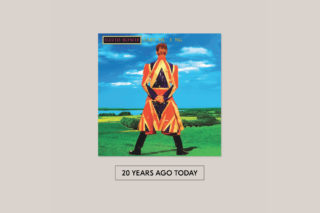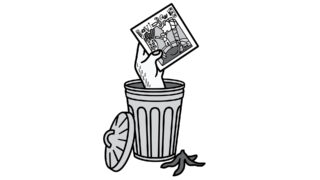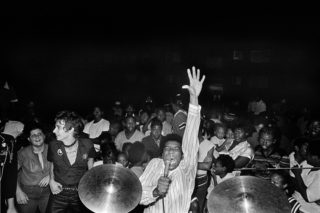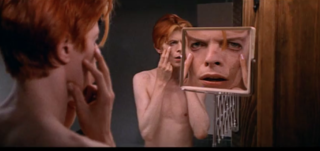UK album chart peak: #6
The cover of ‘Earthling’ features David Bowie in a none-more-90s Alexander McQueen Union Jack trenchcoat, surveying his green and pleasant land from a conquering vantage point, in a sort of Cool Britannia echo of Caspar David Friedrich’s romantic painting Wanderer Above The Sea Of Fog. That Bowie might look out proudly over his musical domain in early 1997 while draped in the flag is understandable: after all, much of the most successful British music of recent years had revisited his 1970s output with deference, love and varying degrees of transparency. (Indeed, Blur’s ‘M.O.R.’, shortly to be released on their eponymous fifth album, was such a blatant lift of ‘Boys Keep Swinging’ that Bowie received a writing credit.)
Yet Bowie treats ‘Earthling’ not as the victory lap at which its sleeve hints, but as a vehicle for another stylistic regeneration, this time exploring the latest developments of dance music, in particular jungle, drum’n’bass and trip-hop. While the prospect of a 50-year-old millionaire attempting to make cutting-edge street-level electronica might be met with circumspection, it’s not as if Bowie lacked experience of wading into a genre with little prior knowledge of it and bending it to his will: on 1975’s terrific ‘Young Americans’, he co-opted the sound of Philadelphia Soul for his own advantage, ending up with a hybrid record that remains enjoyably mutant today.
Unfortunately, ‘Earthling’ is not the electronic answer to ‘Young Americans’. Instead, it’s a game but deferential album of flawed homage, sounding less like Bowie’s unique interpretation of a scene and more like a series of pulled punches. Most telling, perhaps, is that where Young Americans featured a band full of musicians deeply embedded in the genre Bowie was invading, such as Luther Vandross and Carlos Alomar, Earthling’s personnel is embarrassingly inexperienced in anything approaching club music. Accordingly, their lack of conviction, and consequent recourse to arena-sized industrial rock at any moment of uncertainty (courtesy of Reeves Gabrels, Bowie’s guitarist in Tin Machine who also produces here, and prompted, presumably, by his tourmates the previous summer, Nine Inch Nails), blights virtually every track.
It leaves ‘Earthling’ as an album of exciting moments, but little more. The minute-long percussion interlude in ‘Little Wonder’, all fidgety amen breaks and fizzy guitar feedback, has an enticing propulsion to it, ‘Battle For Britain’’s mid-way pairing of bare piano with Aphex-flecked IDM is impressively bold, and Gail Ann Dorsey’s bass fills within ‘Telling Lies’’ sporadic junglist stylings make for a satisfyingly unusual cocktail.
Around this, though, Bowie’s accent, the most parodically-cockney it had been since his early Laughing Gnome persona, washes the rest of ‘Earthling’ with a trepidation that rather dampens any potential thrill. “Am I getting it?” Bowie asks, tentatively and seemingly off-mic, after he sings his first verse on ‘Little Wonder’, apparently seeking reassurance about his dabbling. No answer arrives, but had any musicians from the British electronic music scene – established or underground – been involved in ‘Earthling’, the answer would surely have been “no”.
Also out this week in 1997:
Texas – ‘White On Blonde’. Chart peak #1
The Offspring – ‘Ixnay On the Hombre’. Chart peak #17
Spacehog – ‘Resident Alien’. Chart peak #40
To read all the other entries in Sam’s Twenty Years Ago Today blog, click here.







